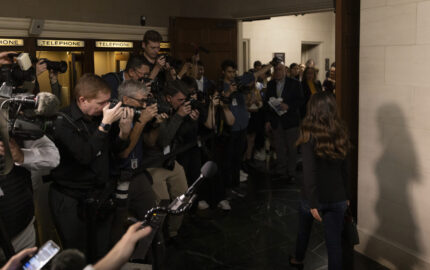In 2024, U.S.-based journalists faced a historic presidential election, while the war in Gaza between Israel and Hamas claimed an unprecedented number of reporters’ lives. Nieman Reports’ feature writers reported on these topics as well as on changes to journalism education, the need for news leaders to develop better business savvy, the evolving relationship between news outlets and social media, and more. As the year comes to a close, have a look at our top five feature stories that resonated most with readers.
For the next era of journalism, news leaders need to hone their business skills for their publications to survive and thrive. But does calling journalism a business demean our mission? The answer is that both things, business savvy and a sense of mission, can coexist, writes Laura Krantz McNeill. “Sustainability doesn’t have to come at the expense of all we stand for, and we need more candid ways of talking about journalism’s mission as it relates to a news organization’s business model,” she writes. Based on interviews with news executives, McNeill shares the top five skills she believes media executives and managers must cultivate to connect with audiences, build new publications from the ground up, and regain trust in the communities they seek to serve.
In the first six months of the latest Israel-Hamas war, which began in October 2023, 95 journalists and media workers were confirmed dead by late March – 90 Palestinians, two Israelis and three Lebanese, according to the Committee to Protect Journalists. That is more journalist fatalities in one conflict zone in six months than have occurred worldwide in one year since CPJ started keeping such records in 1992. John Daniszewski, vice president and editor at large for standards at The Associated Press, spotlights how the war in Gaza is part of an alarming trend of lack of accountability for killers and jailers of journalists.
In the lead-up to the November presidential election, former CNN White House correspondent John Harwood, a 1990 Nieman Fellow, examines the role of the press when a presidential candidate threatens democratic norms, including freedom of the press. Should a reporter actively promote an opposing candidate who is committed to preserving press freedom, or should journalists give both candidates comparable scrutiny? Does maintaining neutrality while an authoritarian seeks power imperil the freedoms the U.S. has embraced since its founding?
Half of Americans now get at least some of their news from social media, according to the Pew Research Center, and surveys indicate that a growing percentage of people trust what they find on social media almost as much as what they find in conventional news outlets. As a result, many U.S. journalism schools are putting greater emphasis on teaching social media production skills, reports Jon Marcus. “In a lot of ways, our students are marketing themselves,” says Amber Hinsley, associate professor and J-school program coordinator at Texas State University. “They’re thinking of themselves as professional storytellers, and not necessarily professional journalists.”
Owned by billionaire businessman Vincent Bolloré, CNews, a broadcast network known for spotlighting far-right viewpoints, is reshaping the political discourse in France, particularly on hot-button issues like immigration, race relations, and national identity. With a daily viewership of around 8 million, the network focuses on opinionated debate shows rather than traditional newscasts. CNews’ editorial priorities reflect a broader trend in media towards promoting polarizing content, writes French journalist Valentine Faure.



